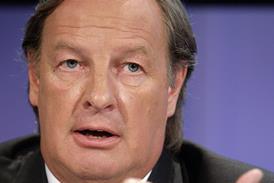Lawyers for and against Britain leaving the EU agree that Brexit would lead to a ‘bonanza’ of work for the legal profession. However, opinion is divided on what impact it would have for major UK law firms operating across Europe.
Around 130 solicitors attended the Law Society yesterday evening to see shadow home office minister Keir Starmer QC MP, Berwin Leighton Paisner partner Chris Bryant, Lawyers for Britain chair Martin Howe QC and Wedlake Bell partner Clive Thorne participate in a heated debate on Brexit and its impact on the legal sector.
Bryant, a competition partner who wishes to remain in the EU, said Brexit would create a ‘bonanza’ of work ‘but it’s a bonanza of work I do not want to have’.
Starmer, another remainer, said there was ‘pretty strong evidence’ that Britain’s withdrawal would be ‘very good for lawyers who specialise in EU law, because for 10 years we will be in complete uncertainty as to vested rights’.
The former director of public prosecutions said EU law operated in ‘slightly different ways’.
‘So there will be huge anxiety and uncertainty,’ he said. ‘Lawyers specialising in the field will have 10 years’ bonanza I think, in terms of making money out of uncertainty, and renegotiating and resettling disputes and agreements.’
However Starmer said Brexit would be ‘very detrimental’ in the long term, ‘because so many of our big law firms operate across Europe. If we were to retreat, we would be operating back from here, without the ability to operate across Europe unless we sign another treaty and see that uncertainty again.’
Thorne, who is in favour of leaving the EU, said major law firms with overseas offices would continue to maintain them in EU member states, adding that ‘we will of course continue to trade. There will be a need for legal services’.
Thorne said there would be a ‘greater impetus’ for areas such as arbitration, commercial law and commercial disputes ‘being determined in the UK’.
‘We have such a strong culture of commercial law in the City of London and that will continue.’
He added: ‘I don’t think it’s going to be a major consequence to legal practice. Yes of course, I agree with Keir, that there may be an initial impetus for lots of work in renegotiating contracts and so on and so forth, and I feel sorry for clients who may be forced to pay for that. But overall I don’t think legal services will suffer greatly.’
Howe, also in favour of leaving the EU, said the idea ‘you can only work or form cross-border partnerships or collaborations within a structure like the EU’ was ‘not right’.
He said Britain’s EU membership was not necessary for its lawyers to prosper, ‘unless you want to prosper by advising clients on unnecessary regulations, which is not a way I would like to prosper as a lawyer’.
A quick show of hands at the start of the evening indicated that the majority of the audience was in favour of remaining in the EU. A handful indicated they wished to leave; around 10 or so were undecided.
By the end of the debate, one person indicated their mind had been changed.






























5 Readers' comments